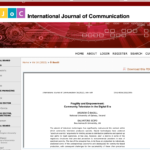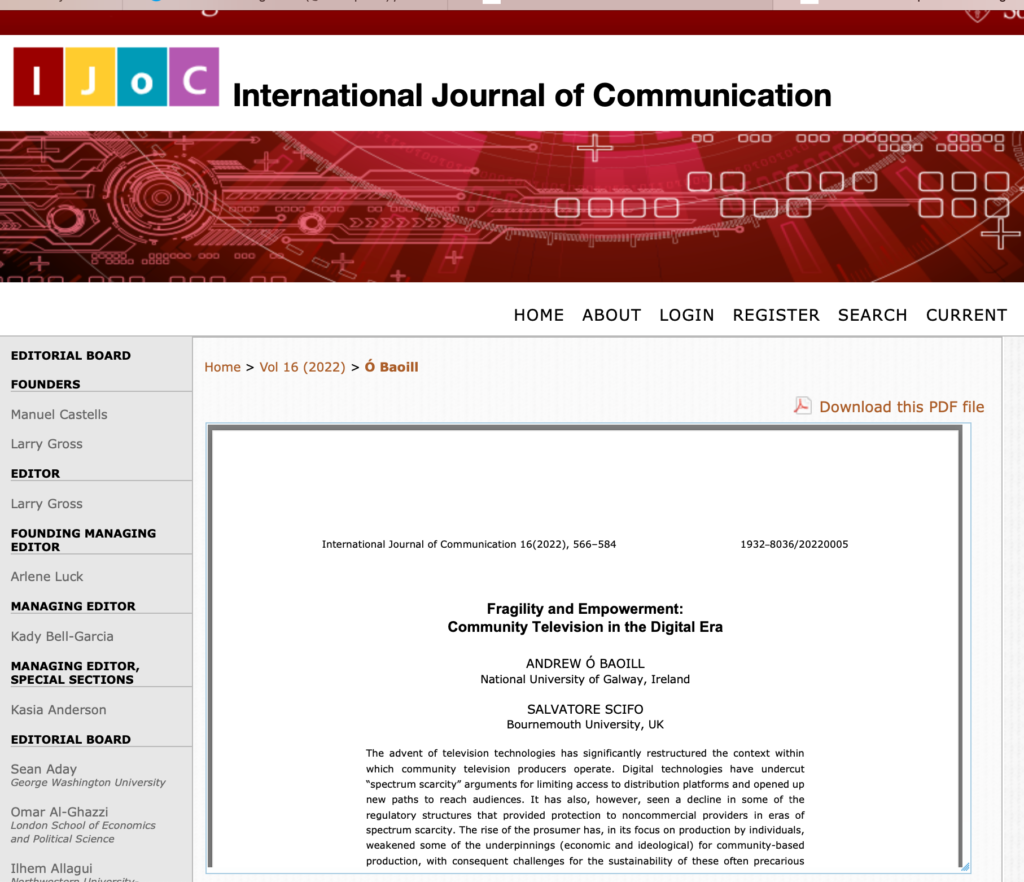Towards resilient community media
A conference at NUI Galway (Ireland), 13-15th June, 2019
The community media sector has been the focus of an increasing amount of scholarly attention as it has grown in size, from social movement theorists, to political economists, to those focused on governance and organisational communication.
Maintaining community media organizations poses a complex challenge, requiring ongoing attention to funding, to governance structures, to changing political and economic conditions, and to the task of building and consolidating relationships with communities. The challenge is exacerbated by the operation of community media within a capitalist system that is antithetical to the values of collaboration, non-commercialism, and inclusion that are at the core of work in this area. As Atton and Hamilton (2008: 26) note in their analysis of the political economy of alternative journalism, the “general political-economic dilemma for any critical project is that it needs resources with which to work, but those crucial resources are present only in the very society that it seeks to change or dissolve.”
This conference will provide an opportunity to reflect on questions of resilience and endurance as they arise in community media, and to explore the various interdependent factors that can impact the ongoing stability and health of community media projects. In addition to welcoming research grounded in particular case studies, we look forward to papers that will, in a holistic fashion, explore the role and operation of the sector in the context of broader socio-political concerns.
Contributions are invited from academics (including emerging and early-career scholars) exploring these issues, as well as from those working within the community and alternative media sectors.
Areas of focus might include (but are not limited to):
- Analysis of the political economic contexts within which community media operate, including regulatory, financial, and staffing challenges.
- Exploration of issues of governance and internal organisation
- Analysis of sectoral cooperation and collaboration.
- Questions of ethos, including issues of localism, defining community, ideology, and purpose.
- Maintaining and refreshing relationships with communities.
- Grappling with the ongoing tension between pragmatism and idealism.
- Case studies of community or alternative media projects, including historical case studies, that provide insights into one or more issues of relevance to the conference theme.
In the first instance, proposals should be sent to andrew.obaoill@nuigalway.ie, and should include:
- Author name and affiliation(s)
- Paper title
- 200-word abstract
The conference will open the evening of Thursday 13th, with academic sessions throughout the day on Friday 14th. Saturday 15th will include a field trip to the site of the Marconi transatlantic wireless telegraphy station in Connemara, supported by funding from the Broadcast Authority of Ireland, along with a visit to the studios of Connemara Community Radio.
Proposals are requested by 30 April, 2019. Proposals will be reviewed on a rolling basis.
It is anticipated that selected papers from the conference will be published as a themed issue of a relevant academic journal.
This conference is made possible with the support of the Broadcasting Authority of Ireland and of the NUI Galway College of Arts, Social Sciences, and Celtic Studies.



 Many of my friends and colleagues will have been familiar with my own one-person campaign against Unofficial, and in this work I both reflect on that and seek to problematise some of the issues that arise, such as cultural authenticity/essentialism; the differing priorities and strategies of various institutional players (University of Illinois, Irish tourism and business interests, global drinks companies, Urbana-Champaign bar owners, etc.); intersectionality of privilege ethnic identity; my own attitude and position in the debate.
Many of my friends and colleagues will have been familiar with my own one-person campaign against Unofficial, and in this work I both reflect on that and seek to problematise some of the issues that arise, such as cultural authenticity/essentialism; the differing priorities and strategies of various institutional players (University of Illinois, Irish tourism and business interests, global drinks companies, Urbana-Champaign bar owners, etc.); intersectionality of privilege ethnic identity; my own attitude and position in the debate.